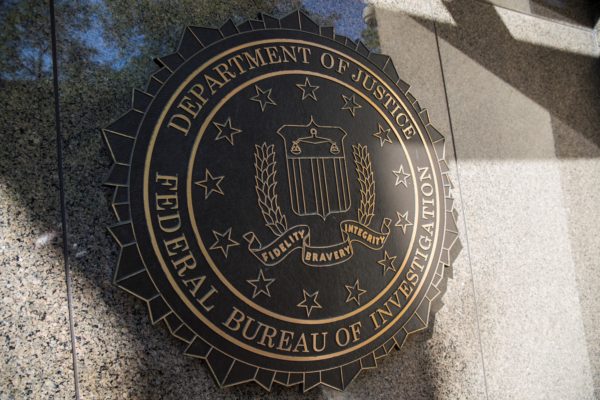So-called “black identity extremists” and animal rights/environmental activists were among the FBI’s top counter-terrorism priorities under President Donald Trump, according leaked documents obtained by The Young Turks.
The bureau’s priority list, published Thursday, lays bare the FBI’s focuses in the areas of counter-terrorism, cyber crime and counterintelligence during the 2018 fiscal year, Newsweek reported.

The FBI’s “black identity extremist” designation was met with criticism, as the agency set its focus on African-American activists while white nationalists have proven to be a clear threat. (Photo by Samuel Corum/Anadolu Agency/Getty Images)
In “Threat Guidance” documents published that year, the agency described “black identity extremists,” or (BIEs), as those “who use force or violence in violation of criminal law in response to perceived racism [and] injustices in American society.” The “BIE” label, first used in an internal FBI report from 2017, sparked outcry from critics who considered the designation as bogus, as there is no meaningful movement of African-Americans willing to take up arms against the government.
Meanwhile, the threat of white nationalist extremism has continued to grow in recent years.
Despite the backlash, the bureau hung on to the term and named BIEs — now referred to as “Black Racially Motivated Extremists” — among its top priorities. The Consolidated Strategy Guides documents leaked last week put a target on so-called Black extremists who the FBI claims had hopes of “establishing a separate Black homeland or autonomous black institutions, communities or governing organizations within the USA.”
The document also characterized BIEs as those “likely to target civilian and government entities that are perceived as oppressors ” — including, but not limited to, law enforcement officers, the U.S. government, members of rival BSE [Black Supremacist Extremists] groups, and individuals based on race, ethnicity, sexual orientation and religion.”
“The FBI judges some RMVE perceptions of police brutality against African Americans served as justification for premeditated, retaliatory violence against law enforcement in 2016,” it adds.
Under Trump’s administration, “black extremists” are considered a larger, more serious threat than terror groups like al-Qaida and white identity extremists. “Animal rights/ environmental extremists” and “anti-authority extremists” were also listed among the bureau’s top existential threats, TYT reported.
The revelation comes less than a week after FBI officials underscored the threat of possible copycat attacks by domestic terrorists in the wake of two deadly shootings in El Paso, Texas, and Dayton, Ohio. The massacres, which occurred within 24 hours of each other, left more than 30 people dead.
John Bash, the U.S. Attorney for the Western District of Texas, said federal authorities would investigates the El Paso incident as an act of “domestic terrorism,” and are considering bringing hate crime and federal weapons charges against the suspect — a 21-year-old white man who confessed to trying to “kill as many Mexicans as possible” in the attack.
“We’re going to do what we do to terrorists in this country, which is to deliver swift and certain justice,” Bash told reporters last week.
The documents from 2018 show that the FBI wrongly predicted there would be “attrition” and declining membership within white nationalist and other national extremist groups, according to TYT. It was just last month that FBI Director Christopher Wray revealed that a large chunk of domestic terror-related arrests made by the agency since October have been tied to white supremacy.
“I will say that a majority of the domestic terrorism cases that we’ve investigated are motivated by some version of what you might call white supremacist violence, but it does include other things as well,” Wray told the Senate Judiciary Committee in July.
In the leaked documents, the FBI detailed its plans to “mitigate” the alleged threat posed by the Black extremist movement via a program called “IRON FIST.” White identity extremists were still on the agency’s top priority list at the time.
“IRON FIST is designed to evolve and adapt to the ever-changing threat posed by BIEs, to proactively address this priority domestic terrorism target by focusing FBI operations via enhanced intelligence collection efforts,” a 2018 FBI threat guidance document reads.
The effort also included tactics to use the felony status of alleged black identity extremists against them.


